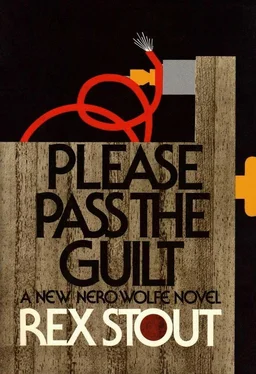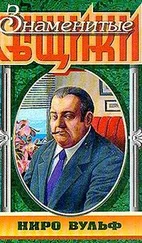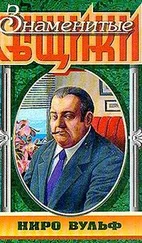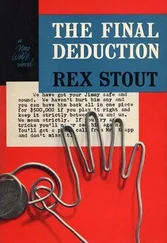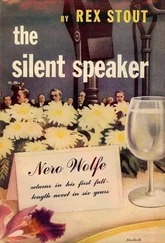Silence, a long minute, then, “I think you’re lying.”
“No. A lie that would be exposed in three hours? No.”
“You know who did that? You know now?”
“Yes.”
A shorter silence. “I’ll call you back.”
He hung up. Of course that meant yes. He wouldn’t call Cramer, and even if he did, what would that get him? I looked at Wolfe. Sometimes you can tell pretty well how good his hand is by the way he holds his head, and his mouth. That time I couldn’t. No sign. I asked him, “Must we leave the room while you’re telling them? We’re curious. We’d like to know too.”
“You will.” He looked at the wall clock. 12:25. “Now. Saul, ask Fritz to bring the champagne.”
As Saul left, the doorbell rang, and I went. It was Orrie Cather. I opened the door and said, “Greetings. Go ahead and tell me you know who Dennis Copes’s twin sister’s husband is.”
“Huh?” He stepped in. “I didn’t know he had a sister. I got bounced from the CAN building.”
“Sure. They knew you like champagne. Go right in.”
So Orrie was there for the briefing too.
The vice-president and his secretary came on the dot at half past two. Precisely.
We were well-filled. Inside our bellies were three bottles of Dom Perignon champagne, braised sweetbreads with chicken quenelles (small portions because of the unexpected guests), crab meat omelets (added attraction), celery and mushroom salad, and four kinds of cheese. Inside our skulls were the details of where it stood according to Wolfe and the program for the next hour or two. For where it stood I would have given good odds, say ten to one, and so would the other three. For the program, no bet. It was a typical Wolfe concoction. It assumed — he assumed — that if an unexpected snag interfered, he would be able to handle it no matter what it was, and your ego has to be riding high to assume that.
To prepare for it only two props were needed. One was the Copes tape in the playback on my desk. For the other all four of us went to the basement. I could have done it alone, but they wanted to help. In a corner of the big storage room there were two thick, old mattresses, no springs in them, which I had used a few times for targets to get bullets for comparison purposes. We decided the best place for them was under the pool table in the adjoining room, where it had been installed when Wolfe had decided that he needed some violent exercise. Doubled, the mattresses were a tight fit under it.
The three were to be in the front room, but when the doorbell rang Saul went to receive the guests and show them in. They didn’t have their war paint on. Browning was not a dragon snorting fire, and Helen Lugos was not set to use her claws on someone who had called her a liar. He sat in the red leather chair and said he had an appointment at a quarter past three, and she sat in a yellow one and said nothing.
“This will take a while,” Wolfe told Browning. “Perhaps an hour.”
“I can’t stay an hour.”
“We’ll see. I’ll make it as brief as possible. First you must hear a recording of a conversation I had recently with a member of your staff, Dennis Copes. Here. He came last Thursday evening. — Archie?”
I flipped the switch, and for the fifth time I heard Copes speak highly of that ad. Another time or two and I would begin to think I had picked the wrong line of work, that by now I could have been a vice-president myself, at one of the big agencies. As I had with Cramer and Rowcliff, I watched their faces. Their reaction was very different from the cops’. They looked at Wolfe hardly at all. Mostly they looked at each other, him with a frown that developed into what you might call a gawk, and her first with her eyes wide and then with her lips parted. Twice she started to say something but realized she had to hold it. When it came to the end and I turned it off, they both started to speak at once, he to her and she to him, but Wolfe stopped them. “Don’t,” he said, loud enough and decisive enough to stop anybody. “Don’t waste your breath and your time and mine, I know he lied. It was all a fabrication. That has been established, with the help of Inspector Cramer. He heard the recording this morning. I should tell you, and I do, that this conversation is not being recorded. I give you that assurance on my word of honor, and those who know me would tell you that I would not tarnish that fine old pledge.”
Browning demanded, “If you know he lied why bother us with it? Why do you waste our time?”
“I don’t. You had to hear part of it, and to appreciate that part you needed to hear the whole. I have—”
“What part?”
“You said your time is limited.”
“It is.”
“Then don’t interrupt. I have a good deal to say and I am not garrulous. The kernel of Mr. Copes’s fabrication was of course the quotation — what he said he heard Kenneth Meer say.” To Helen Lugos: “You say he didn’t say that? That that conversation didn’t occur?”
“I certainly do. It didn’t.”
“I believe you. But his invention of it told me something that he did not intend and was not aware of. It told me who put the bomb in the drawer, and I’m going to tell you how and why. As I said, I’ll make it brief as possible, but you should know that Kenneth Meer is responsible for my concern in this affair. On May twenty-sixth, a Monday, he went to a clinic, gave a false name, and told a doctor that he needed help; that he got blood on his hands recurrently, frequently, not visible to anyone else. He refused—”
Browning demanded, “A clinic? What clinic?”
“Don’t interrupt! To include all details would take all day. I assure you that anything I do include can be verified. He refused to give any information about himself. A friend of that doctor, another doctor, consulted me, and Kenneth Meer, still using an alias, came to see me. He still refused to supply any information about himself, but by a ruse, Mr. Goodwin and I learned who he was, and of course we had seen his name in the published reports of the death of Peter Odell. That led to my being consulted by Mrs. Odell and her hiring me. Naturally—”
“So that’s how—”
“Don’t interrupt! Naturally I considered the possibility that Meer had supplied the bomb and was racked by his sense of guilt. But surely not intending it for you, and information given me by Mrs. Odell made it extremely unlikely that he could have known that Peter Odell intended to go to your room and open that drawer. I will not elaborate on that. I have included that detail, how I first saw Kenneth Meer, only to explain why he has been of special interest throughout. There has always been for me that special reason to suspect him, but there was no plausible basis for a charge. Or rather, there was, but I hadn’t the wit to see it. I admit I should have. Mr. Copes revealed it to me.”
He turned a palm up. “If you undertake to invent something you heard another man say and you’re not a fool, you make it conform to his character, his knowledge, and his style. And Copes had Kenneth Meer saying to Miss Lugos, ‘I want to be damn sure you don’t open the drawer to take a look at the usual time.’ Would he have had him say that to her, especially the ‘usual time,’ unless he knew, or thought he knew, that Miss Lugos was in the habit of looking in the drawer every day, and that Meer knew it? When he wanted to make the invented quotation not only conceivable but as credible as possible? He would not. He would have included that ‘usual’ only if it conformed to his knowledge of the facts. Of course if he knew that Miss Lugos had told the police — and Mr. Goodwin — that she had not habitually opened the drawer every day, it was a blunder to include the ‘usual.’ It was a blunder even if he didn’t know that, because it wasn’t necessary, but he included it because he thought it increased the credibility of his lie.”
Читать дальше
